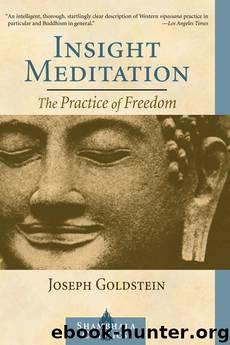Insight Meditation by Joseph Goldstein

Author:Joseph Goldstein
Language: eng
Format: epub
Publisher: Shambhala Publications
Guilt
A close colleague of unworthiness, walking hand in hand with it through our heart and mind, is guilt. This mind state or emotion often intrudes into situations where we may have done or said unskillful things that caused suffering to ourself or to others.
It is important to know that we actually have a choice about how we treat such situations. The customary response is to condemn ourselves, to have that feeling of “I’m so bad.” But this state of harsh self-judgment is really a trick of the ego. The mind or the ego tricks us into solidifying a sense of self, of “I,” in a negative judgment.
This sense of self is not a solid, continuous structure in the mind that we have to get rid of. We create the sense of self anew in each moment when we are not mindful, when we are identifying with whatever is happening. So in every moment of awareness, wisdom frees us from the contraction of self, because ego delusion is as discontinuous and impermanent as everything else. The wisdom of mindfulness and the delusion of selfhood cannot coexist at the same time; the one drives out the other.
As guilt arises in our mind, it is fed when we identify with it and make it “self,” when we fail to notice it with awareness. So when guilt comes, make that the object of your awareness. Note it. In the moment of recognition, acceptance, and nonidentification—this is difficult, and it may take some time to master—you can see what a flimsy paper tiger this fierce mental force really is. Guilt arises, you note it, and in that moment of noting, when you no longer identify with it, it falls away.
In contrast to guilt there is another possible response to our unskillful actions. We might think of this response as wise remorse. We acknowledge and accept that we have done something unskillful, we understand its unwholesomeness, we see that it bears certain fruits, and with wisdom we let our acknowledgment be the force for restraining such actions in the future.
Thus we avoid that slippery, inverse trick of aggrandizing ego through negative stress on self. We feel wise remorse in a mental environment of forgiveness, because forgiveness recognizes the truth of change; what happened in the past does not have to happen in the future. There is no forgiveness in guilt because we have congealed the sense of self into a kind of unchanging stasis through negative self-judgment; according to guilt, “once bad, always bad.”
One time when I was in retreat, guilt came up very strongly and unpleasantly about a particular thing I had done. It came so incessantly that I drew closer to it, very interested in understanding how I was so enmeshed in it: “Okay, what’s going on here? What is this? What is this suffering about?” Finally I saw that the guilt I felt was really just a ruse of the ego, which had tricked me into creating a sense of “I.”
Here was the work of Mara.
Download
This site does not store any files on its server. We only index and link to content provided by other sites. Please contact the content providers to delete copyright contents if any and email us, we'll remove relevant links or contents immediately.
| Acupuncture & Acupressure | Aromatherapy |
| Ayurveda | Chelation |
| Chinese Medicine | Energy Healing |
| Healing | Herbal Remedies |
| Holistic | Homeopathy |
| Hypnotherapy | Massage |
| Meditation | Naturopathy |
| Reference |
Inner Engineering: A Yogi's Guide to Joy by Sadhguru(6782)
The Power of Now: A Guide to Spiritual Enlightenment by Eckhart Tolle(5741)
Fear by Osho(4724)
Ikigai by Héctor García & Francesc Miralles(4228)
The Art of Happiness by The Dalai Lama(4118)
The Ultimate Bodybuilding Cookbook by Kendall Lou Schmidt(3925)
Yoga Therapy by Mark Stephens(3739)
The Little Book of Hygge by Meik Wiking(3675)
The Healing Self by Deepak Chopra(3564)
Why Buddhism is True by Robert Wright(3439)
The Hatha Yoga Pradipika (Translated) by Svatmarama(3312)
Being Aware of Being Aware by Rupert Spira(3264)
Shift into Freedom by Loch Kelly(3190)
Wild Words from Wild Women by Stephens Autumn(3133)
Work Clean by Dan Charnas(3108)
Happiness by Matthieu Ricard(3037)
More Language of Letting Go: 366 New Daily Meditations by Melody Beattie(3017)
Yoga Body & Mind Handbook by Jasmine Tarkeshi(2861)
Why I Am Not a Feminist by Jessa Crispin(2737)
